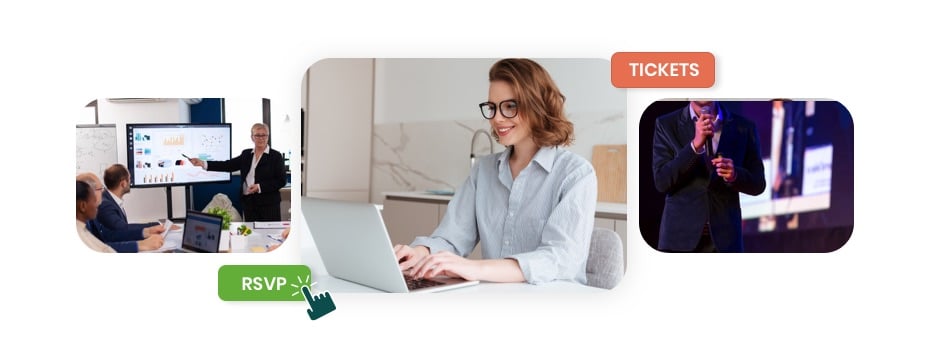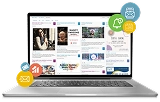
How to Plan a Training Workshop That Delivers Real Results
Workshops are essential for personal and professional growth, providing opportunities for collaboration, skill-building, and innovation. Whether you are planning a training workshop for team building, to introduce employees to a new tool, or brainstorm solutions to pressing challenges, a well-organized approach ensures success.
When planning a training workshop, clarity, structure, and engagement are key. This guide will walk you through the steps on how to plan a training workshop that resonates with participants, achieves its objectives, and drives measurable results. By learning how to organize a workshop effectively, you can elevate your company's training sessions and team events to new heights.
I. How to Plan a Training Workshop Effectively?
Planning a training workshop that truly delivers value requires more than just picking a date and booking a venue. From setting clear objectives to engaging participants and measuring outcomes, every step plays a critical role in the workshop’s success. Follow these practical tips to ensure your next training session is well-organized, impactful, and aligned with your goals.

1. Start by Defining Clear Objectives
Every great workshop begins with a well-defined purpose. Ask yourself:
- What problem are you solving?
- What do participants need to learn or achieve?
For instance, instead of a broad goal like "improve communication," aim for something specific like "teach conflict resolution strategies to enhance interdepartmental collaboration." Clear objectives will help in planning a training workshop that’s focused and impactful.
If you're planning a workshop for training or upskilling, break down your objectives into actionable goals to track progress easily.
2. Know Your Audience Before Planning a Training Workshop
Understanding your audience’s preferences and needs is essential for planning a training workshop that resonates. Consider these factors:
- Participant roles and experience levels
- Preferred learning styles (e.g., hands-on activities vs. lectures)
- Interests and expectations
When organizing a workshop for a diverse group, sending out pre-event surveys can provide valuable insights to tailor your session. This ensures relevance and keeps your audience engaged.
3. Choose a Relevant Theme and Format
The theme sets the tone for your workshop plan. Choose one that aligns with your objectives and interests participants. Common themes include:
- Leadership development
- Team collaboration
- Industry-specific skills
Select a format that supports your goals:
- In-person workshops for interactive activities.
- Virtual workshops for remote teams.
- Hybrid workshops for maximum flexibility.
Designing workshops with hybrid formats allows you to cater to a wider audience, combining the best of both virtual and physical environments.

4. Plan a Workshop Agenda That Keeps Participants Engaged
A well-structured agenda is crucial for a successful session. Break the workshop into digestible segments:
- Introduction (10–15 minutes): Share objectives and set expectations.
- Main Sessions (30–60 minutes): Cover core content.
- Interactive Breaks: Include activities or discussions to maintain energy.
- Closing: Summarize key takeaways and outline next steps.
Planning a workshop agenda ensures participants stay focused and gain value from each segment.
5. Select an Engaging Facilitator for Your Training Workshop
The facilitator is the backbone of your workshop. They should:
- Be knowledgeable about the subject.
- Adapt to various learning styles.
- Use engaging techniques to foster interaction.
A skilled facilitator can make complex topics accessible and drive deeper engagement during the workshop.
6. Focus on Planning Your Training Workshop to be Interactive
Interactive workshops improve knowledge retention and keep participants engaged. Some examples include:
- Group exercises and case studies.
- Technology tools like polls or whiteboards.
- Real-world scenarios for hands-on problem-solving.
Designing a workshop with interactive elements transforms it from a passive session to an active and memorable learning experience. For ideas on making your workshop stand out, explore our article Unique Corporate Workshop Ideas for Memorable Events, where you’ll find innovative approaches to designing impactful sessions.
7. How to Organize Workshops: Invest in the Right Tools and Environment
Creating the right environment—whether in person or virtual—is essential for delivering a smooth, engaging, and impactful workshop. When participants feel comfortable and supported by the setup, they’re more likely to stay focused, interact, and retain information.
When organizing in-person workshops, think beyond just a room and a projector. Aim to provide:
- Comfortable seating and good lighting to keep participants physically at ease.
- High-quality audio-visual systems to ensure everyone can see and hear clearly, regardless of where they’re seated.
- Breakout areas or flexible room setups for group work and informal discussions.
- Whiteboards, flip charts, or sticky notes for interactive activities and brainstorming.
For planning virtual workshops, your tech stack makes all the difference. Look for platforms that offer:
- Stable video conferencing with HD video and audio.
- Interactive features like breakout rooms, polls, live chat, and Q&A to keep people involved.
- Screen sharing and collaborative tools like Miro, Google Docs, or Notion for real-time participation.
- Recording capabilities so attendees can revisit content after the session.
Bonus tip: Test all tools and platforms in advance—tech hiccups can quickly derail a great workshop.
Choosing the right tools and environment signals professionalism and care, making planning a training workshop not only more enjoyable but also more effective.
8. Promote Your Workshop Effectively to Drive Attendance
Even the best workshop won't succeed without attendees—promotion is critical. To fill seats and spark interest, you need a targeted and compelling outreach strategy that clearly communicates the value of your session.
Here are a few proven tactics to boost visibility and attendance when planning a training workshop:
- Email Campaigns: Craft personalized emails that highlight the key takeaways and benefits of attending. Use attention-grabbing subject lines, clear calls-to-action, and consider sending reminder emails as the event approaches.
- Social Media Marketing: Create eye-catching graphics, teaser videos, and countdown posts to build excitement. Tailor your messaging to each platform—what works on LinkedIn might not resonate on Instagram.
- Internal Communications: For internal employee workshops, use channels like Slack, intranet announcements, or company newsletters to reach your team. Include registration links, calendar invites, and encourage managers to promote it to their teams.
- Event Listings and Calendars: Share your workshop on relevant industry or community event calendars, meetup groups, and platforms like Eventbrite or Facebook Events to reach a broader audience.
- Influencer or Partner Amplification: Ask partners, speakers, or internal advocates to promote the event to their own networks. A personal endorsement can go a long way.
- Landing Page or Microsite: Create a dedicated event page that outlines the agenda, speakers, learning outcomes, and how to register. Make it easy to share and navigate.
Above all, when planning a training workshop, make sure every communication clearly highlights the value for the attendees. Whether it’s learning a new skill, gaining valuable insights, networking with peers, or advancing their professional development, participants need to understand exactly how they will benefit from attending.

9. How to Plan a Training Workshop: Measure Success and Gather Feedback
Evaluate the workshop's effectiveness by collecting participant feedback. Methods include:
- Conducting post-event surveys to gather feedback.
- Tracking measurable outcomes like improved skills or enhanced team dynamics.
- Analyzing participant engagement during sessions.
Organizing a workshop doesn’t end with the event; measuring its success is essential to improve future sessions.
10. Follow Up and Reinforce Learning
Post-event follow-ups are essential for participants to apply what they’ve learned. Share:
- Session recordings and key materials.
- Additional resources to deepen understanding.
- Personalized feedback or next steps to maintain momentum.
Effective follow-ups ensure lasting value from your workshop efforts.
II. How Timely Simplifies Planning a Successful Training Workshop?
Training workshops are essential for professional development, team collaboration, and solving real-world challenges. With the right strategy—and the right tools—you can deliver sessions that truly engage and drive results. This guide equips you with a clear roadmap for planning an impactful workshop. And when it comes to execution, Timely makes the process effortless.
Planning a workshop often involves juggling multiple tasks—scheduling, registrations, payments, and communication. Timely’s training management software brings all these elements together in one powerful platform. From publishing course catalogs to tracking attendance, Timely helps you deliver professional, well-organized workshops with minimal effort.
Key Features That Make Workshop Planning Easy:
- Dynamic Course Catalogs: Easily publish, promote, and manage all training sessions from one centralized calendar.
- Customizable Registration Forms: Collect the participant information you need with fully customizable forms.
- Integrated Payment Solutions: Accept and manage payments online via your website or offline at point of sale.
- Advanced Reporting Tools: Gain valuable insights and track workshop success with detailed analytics and engagement metrics.
With tools like those offered by Timely, the process of planning a training workshop becomes even more efficient and effective. Whether you’re organizing a workshop for skill-building or innovation, Timely is the ultimate solution to ensure success. Start your journey with Timely today!





